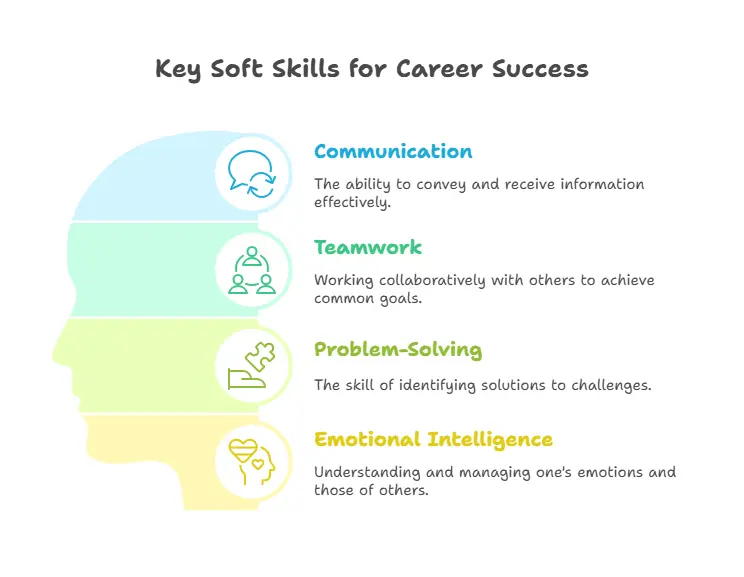Table of Contents
Technical expertise and credentials are only half the fight in today’s competitive job market. Successful professionals’ capacity to communicate, work together, and cooperate effectively—skills that have no degree but are absolutely essential in any organization—distinguishes them. These are known as soft skills, and in almost every profession they are currently the cornerstone of professional success. Regardless of whether you are beginning your career or seeking to move ahead in your current role, learning and enhancing your soft skills will create opportunities, build connections, and enhance your long-term career power. In this article, let’s explore the role of soft skills in career success apart from the tech skills.
Begin Your Personality Transformation- Enroll Today!
The Role of Soft Skills in Career Success
Soft skills—that is, emotional, interpersonal, and communication skills—allow people to engage with others in the workplace with efficacy. While soft talents are what can either help or ruin you when it comes to moving up the corporate ladder, hard skills will get you beyond the door.
How do soft skills impact your career?
- Establish friendly working contacts with colleagues and clients.
- Manage challenging events, including disagreement, criticism, or tough talks, with experience.
- Work successfully between departments and across cultures.
- Show leadership without a title.
- Change with the times and show fortitude in hectic settings.
Basically, soft skills are the human component that gives your professional skill set life.
Essential Soft Skills For Career Success
Soft skills are those personal and social ones that enable someone to perform effectively in work. Unlike technical abilities, they are not work-specific but rather quite important for creating strong connections, adjusting to change, and also efficient problem-solving. Professionals that possess communication, teamwork, problem-solving, and emotional intelligence will be able to confidently and flexibly advance in the present work environment. Developing your soft skills improves not just your employment but also your chances for continuous success and professional development.
 Communication
Communication
Communication is the ability for proper and efficient transmitting of information by speaking, writing, or listening. It’s not about speaking—it’s about getting your word heard and forming strong relationships through means of considerate, candid communication. It’s also communicating properly by altering your message based on the situation and audience.
Example: During a team meeting, while giving project updates as their leader, being able to explain progress in simple-to-grasp, easy-to-understand language keeps everybody on the same wavelength—and inspires trust in stakeholders.
Teamwork
Teamwork is the ability to work with others effectively for a common goal. Teamwork involves sharing responsibilities, appreciating different viewpoints, cooperating, and contributing to a group’s work. Collaboration is essential in any career, especially when performing work with cross-functional teams or common projects.
Example: When creating a marketing campaign, collaboration with graphic designers, writers, and social media managers enables the campaign to be coordinated and effective.
Adaptability
Flexibility is your willingness to adapt to new circumstances, learn new tools, or alter your approach when circumstances change. For today’s fast-paced work environments, flexibility is necessary in order to stay up to speed and keep producing under stress.
Example: When your company shifts from office work to working from home, your willingness to learn computer program collaboration software and keep on working from home illustrates great flexibility.
Emotional Intelligence (EQ)
Emotional Intelligence (EQ)
Emotional intelligence is the ability to recognize, understand, and manage your own feelings and empathize with others. EQ helps you handle workplace stress, resolve conflicts peacefully, and create a positive environment for others.
Example: When a project colleague gets upset during a project, being able to listen with sympathy and help them get past the challenge with emotional intelligence can build team morale and outcomes.
Problem-Solving
Problem-solving is the ability to assess situations, identify problems, and develop effective, well-thought-out solutions on time. Employers value candidates who can make a move, think critically at critical moments, and make obvious decisions—most especially during crises.
Example: In case of a software upgrade leading to a glitch in a customer’s dashboard, a competent problem-solver will determine where the glitch occurs, describe the fix to the customer, and implement steps for avoidance.
Time Management
Time management is task organization, task prioritizing, and deadline meeting without feeling overburdened. It calls for discipline, concentration, and the capacity for juggling several obligations.
For example, adopting a calendar and establishing milestone deadlines can enable you to complete all activities on time without sacrificing quality if you are managing several client deliverables.
Leadership
Leading is about initiative, motivating others, and modeling good behavior—not only about running over others. Showing leadership can win you respect and open doors to new possibilities even in non-managerial positions.
For example, you have shown leadership if you volunteer to organize a team project, assign work depending on individual strengths, and lead the group toward a favorable result.
Begin Your Personality Transformation- Enroll Today!
Boost Your Skills & Kickstart Your Career!
Employability and Personality Development Course by Entri App: Enhance your communication, confidence, and job-ready skills to excel in your career.
Join Now!Soft Skills in Different Career Fields
Whether your field of employment is business, engineering, education, healthcare, or the creative arts, soft skills are important in every one. They enable experts to clearly express themselves, tackle challenges, function in groups, and change with the times. For instance, teachers rely on patience and communication, while engineers depend on teamwork and problem-solving. Soft skills help you to interact with others, manage obstacles, and advance in your profession regardless of the position.
Healthcare
Soft qualities, including emotional intelligence, active listening, and empathy, are equally as vital in the healthcare field as medical knowledge. Patients must be connected to doctors, nurses, and caregivers who also must adequately explain treatments and grasp their emotions. Good communication and a sympathetic attitude can help to establish confidence and raise patient outcomes.
Engineering and IT
Although technical knowledge is crucial in engineering and IT, soft skills such as adaptability, teamwork, and problem-solving enable professionals to cooperate on challenging projects. Communication is therefore very important since engineers frequently have to explain technical concepts to non-technical individuals. Being cool and adaptable helps greatly when unanticipated difficulties surface.
Education
Every day soft skills are used by teachers and other professionals. Their emotional intelligence, flexibility, and patience enable them to meet the demands of the kids. Clear instruction and the development of good relationships between instructors, parents, and students depend on effective communication as well.
Business and Management
Soft skills, including leadership, decision-making, time management, and communication, are absolutely vital in business employment. Managers must inspire groups, resolve issues, and make wise, fast judgments. Establishing close bonds with clients and colleagues promotes the expansion of the company.
Customer Service and Sales
Jobs confronting customers call for soft skills including patience, listening, problem-solving, and a nice demeanor. Being courteous and sympathetic helps a client to develop loyalty and trust, whether it comes to a good or a service or addressing problems.
Creative Fields (Design, Media, Writing)
Key in creative professions are openness to criticism, communication, teamwork, and an honest approach. Many times working with teams or clients, artists, writers, and designers must also grasp the ideas of others. Being flexible and receptive helps one to manage changes and fresh ideas.
Conclusion
Although hard skills could win you a job, your soft skills promote long-term professional development and fulfillment. Companies of all kinds are seeking people who can complete duties and lead with empathy, communicate effectively, and meet problems. Working on your soft skills helps you to improve not just your professionalism but also your team player, leader, and personal development.
Start today – your human abilities will always be in demand in a world undergoing continual change.
| Related Articles | |
|---|---|
| Top Personality Development Tips | Importance of Personality Development |
| Communication Skills and Personality Development | How to Write a Salary Negotiation Email |
Boost Your Skills & Kickstart Your Career!
Employability and Personality Development Course by Entri App: Enhance your communication, confidence, and job-ready skills to excel in your career.
Join Now!Frequently Asked Questions
Why are soft skills important for career success?
Soft skills are essential for building relationships, solving problems, managing time, and working collaboratively—traits that every employer values, regardless of industry.
How do I showcase soft skills on my resume or in interviews?
Use specific examples or achievements. For instance, instead of saying “I’m a good communicator,” mention a time when you led a team presentation or resolved a conflict through communication.
Are soft skills more important than hard skills?
Both are important, but in many jobs, soft skills can make the difference between a good employee and a great one—especially in leadership or customer-facing roles.
How do I know which soft skills I need to improve?
You can start by reflecting on past experiences or asking for feedback from teachers, colleagues, or mentors. Notice if you struggle with time management, communication, or working in a team—those areas might need extra focus.
Are soft skills important for remote jobs too?
Definitely! In remote work, soft skills like clear communication, self-discipline, time management, and adaptability are even more important because you’re working independently and staying connected online.
Can improving soft skills help me get promoted?
Yes! Soft skills like leadership, problem-solving, and emotional intelligence show that you’re ready to take on more responsibility. Employers often promote those who can lead teams, handle pressure, and build strong relationships.



 Communication
Communication







